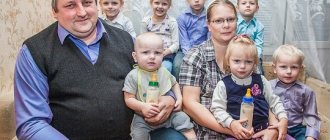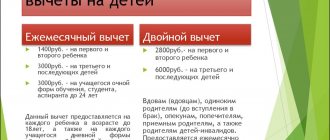Pension benefits for mothers with many children.
It was decided that the increase in the pension qualification would not occur immediately, but in several stages (every year).
In this regard, the first to receive the new benefit are women who gave birth to three and four children, born in 1965 or earlier.
This was first reported by the President of our country, V.V. Putin, when he made a television appeal to the people. This happened in 2018.
New retirement procedure from 2019.
He focused on the fact that we treat the female sex with care, trying to protect them in all areas.
Therefore, Vladimir Vladimirovich proposed amending the bill, namely:
- Workers who were supposed to register pensioner status by 2019-2020 were given the opportunity to retire six months earlier than the new established standards.
- Reduce the pension qualification for the female part of the population from 63 years specified in the bill to 60 years. In this regard, in comparison with the old legislation in this area, a woman will work for 5 years more (compared to the previous eight).
- To provide an opportunity for women with many children to receive pension payments earlier:
- 3 years before the new term, namely at the age of 57, mothers with three children will become pensioners,
- 4 years earlier (i.e. at 56 years old) mothers with four children will begin to receive a pension.
Women raising 5 or more children were already included in the previous 2020 program. They have already been provided with benefits for obtaining a pension. That's why there won't be any changes for them.
They may qualify for early accrual of payments, but this will require compliance with two conditions:
- the insurance period must correspond to the permissible level (minimum – 15 years),
- IPC - exceed the minimum value.
Attention! The text of the law contains a reference to the fact that in order to receive benefits, a mother must raise children up to at least 8 years of age.
What is the amount of deductions?
The bulk of subsidies are similar for all segments of the population. The mother's length of service and the individual coefficient will be calculated according to the standard scheme. In this case, the amount of financial assistance will depend on the insurance transfers accumulated during the work activity, as well as the corresponding length of service.
The basic income of the category of citizens in question will increase in accordance with the established allowance, which varies depending on the number of minors living in the family.
Nuances associated with early termination of professional activity:
- A mother is not able to acquire retirement benefits if she cared for five children but lost parental rights to one of them before the latter turned eight years old. In the case of raising six offspring and depriving the rights to two of them, a similar decision is made. And so on.
- If other conditions are met and rights in relation to the minor are lost after he reaches eight years of age, the preferences remain in force.
- If the mother received a minimum income while working in the regions of the Far North or equivalent areas, then an early change of status is possible when raising two minors.
After the beneficiary reaches eighty years of age, an increase in pension provision is provided. The amount of allowances will depend on the number of minors:
- two - from 6.4 to 12.8 thousand rubles;
- three - from 7.2 to 14.4 thousand rubles;
- one – from 4000 to 11200 rubles.
In addition, the amendments developed new conditions necessary to receive increased material support:
- children must be born before 1990;
- the mother must leave work in 2020.
Conditions for assigning a pension early.
In other words, if a woman is deprived of parental rights, the benefit will not be valid for her.
She will retire like all other women. The one who adopted a child and later abandoned the baby will also be brought up to standard.
Women can apply for a pension earlier than the standard time if the following requirements are met:
- The woman gave birth to three or four children and raised them at least until they were 8 years old.
- The woman worked for a sufficient amount of time, and her total experience exceeded 15 years. Moreover, the total length of service includes those years when the woman was on maternity leave.
- The total number of pension points exceeded 30 IPC.
The most frequently asked question is, what should those who have insufficient experience or IPC do? The answer is simple - bring it to the desired level.
Raising the retirement age for all women.
- Women in the first half of 1964 will retire by 2020 (second half). Their life expectancy will increase by only 0.5 years and will be 55.5 years.
- Women born in the second half of 1964 will retire in 2020 (first half). In this case, the retirement age will increase by six months and will be 55.5 years.
- Women born in the first half of 1965 will receive a pension in 2021 (second half). The retirement age will increase by 1.5 years and will be equal to 56.5 years.
- Women born in the second half of 1965 will begin to realize pension savings in 2022 (first half). The retirement age is 56.5 years, which is 1.5 years more than the original one.
- For those born in 1966, the pension is provided only in 2024. The length of service is 58 years, which is three years more.
- Mothers born in 1967 will have to wait until 2026. Then the age for applying for a pension will be 59 years old, it will increase by 4 years.
- Women of 1968 will retire 5 years later compared to the old legislation - in 2028. Then they will turn 60.
The procedure for calculating insurance length and pension points
Upon the birth of a child, the enterprise is obliged to provide the mother with maternity leave, as well as parental leave for up to one and a half years. The latter is paid in the amount of 40% of the employee’s average earnings. This entire period is included in the labor and insurance period . However, for a mother with many children who has given birth to more than two children, maternity leave will not be counted for everyone, but only for the first-born and second-born. True, a bill was recently put forward to include maternity leave for a third child in the maternity leave period. It turns out that now the increase will not be 3 years, as before, but 4.5.
In addition to the length of service, maternity leave also affects the individual pension coefficient . In accordance with Federal Law No. 400, for the birth and upbringing of each of her children, a woman will receive additional points in the following amount:
- for the first – 1.8 points;
- second – 3.6 points;
- the third and subsequent ones – 5.4 points each.
It turns out that for the birth of five children she will be awarded 21.6 points. And here it’s not far from the minimum 30.
Increasing PV for mothers of three and four children.
Women raising three or four children born in 1964, who could qualify for pension payments by 2020, will not receive new benefits.
Therefore, they will become pensioners, like other women in the standard case - at the end of 2019-beginning of 2020.
Therefore, the first people to retire under the preferential program in the categories under consideration will be:
- women with four children. By 2021, the standard age will be 56.5 years. In this case, for families with many children, a six-month benefit applies. That turns out to be 56 years old. Until 2021 comes, they will apply for a pension on a general basis, as written in the previous chapter.
- Mothers of three children will receive a preferential pension for the first time by 2023. At this time they will be 57 years old. These are women born in 1966. Until 2023, they retire according to general rules.
Should mothers of many children expect raises in 2020?
This year, mothers of many children receiving pension payments from the state should expect the following changes:
- Starting from April 1, 2018, social pensions will be indexed annually by 4.10%. The average size of old-age insurance pension payments will increase by approximately 400 rubles. and can reach 14045 rubles.
- The payment period for the funded part of the pension has been increased to 246 months.
- Women who retired before 2020 and gave birth to children during the USSR (before 1990) can receive an additional payment. For one child the increase will be 1.8 points (3,416 rubles), 3.6 for two (4,270 rubles), and for three or more 5.4 points (5,124 rubles). Mothers who are over 80 years old today are entitled to a slightly larger additional payment: for 1 child 5,970 rubles, for two 6,832 rubles, for three 7,680 rubles. For mothers who have reached the age of eighty and are able to document their disability group, the additional payment will be paid in the amount of: for 1 child 4,000 rubles - 11,200 rubles, for two 644 rubles - 12,800 rubles, for three 7,200 rubles - 14,400 rubles .
- The Government also plans to increase the amount of one-time and monthly benefits for mothers of large families.
About pension provision for mothers of many children, see the following video:
posobie-help.ru
The state provides retirement benefits for mothers with many children. Women acquire this status if they give birth and raise three or more children. It does not matter whether the child is natural or adopted. The status of having many children is retained by the woman until the children turn 18 years old. During this period, parents must support them and provide financially. If a woman is deprived of parental rights, then she is no longer considered to have many children.
Benefits for women who worked in the North.
In Russia, there are workers who receive the most assistance. Among them are people working in the North.
Benefits are provided to these individuals on the basis that working conditions here are incomparably more difficult compared to other areas. In the general situation, they are entitled to receive an insurance pension ahead of schedule for 5 years.
In other words, for a woman to receive pension payments at age 55, the following requirements must be met:
- 15 years of work in the Far North, or
- 20 years of work in a territory equivalent to the conditions of the KS.
If the employee has not worked at the CS all his life, and the length of service at the CS does not reach the specified value, the PV will be reduced in proportion to the actual length of service.
In relation to this category, there is the possibility of a double reduction in PV. For example, if a person worked in hazardous work, his or her PV will be reduced for an additional 5 years.
Moreover, if a mother has two or more children, she has the right to become a pensioner at the age of 50, subject to the following conditions:
- Work experience at the CS must be more than 12 years,
- experience in places equivalent to KS must exceed 17 years.
Surcharge
All kinds of allowances are given if a woman worked during maternity leave, and it was not included in the total length of service. When studying the rights of mothers of many children in Russia, one should also take into account the fact that since the beginning of 2020, certain amendments have been made to the law. However, the changes do not apply to early pensions. Thus, the following categories of women have the right to count on these benefits:
- those who are fifty years old, have given birth to and raised children under eight years of age - five or more, and whose work experience is more than fifteen years;
- fifty-year-olds who gave birth and raised 2 or more children under eight years of age and have a total experience of twenty years, or twelve years in the Far North, or seventeen in an equal territory.
Documents for assigning pensions to families with many children.
To register her pension, a mother of many children must provide the following list of papers to the Pension Fund:
- passport,
- work book,
- children's birth certificates,
- a book by a mother of many children,
- salary documents before 2002, when the deduction of insurance contributions (if any) was not provided for,
- statement.
The period for reviewing documents is 30 days.








